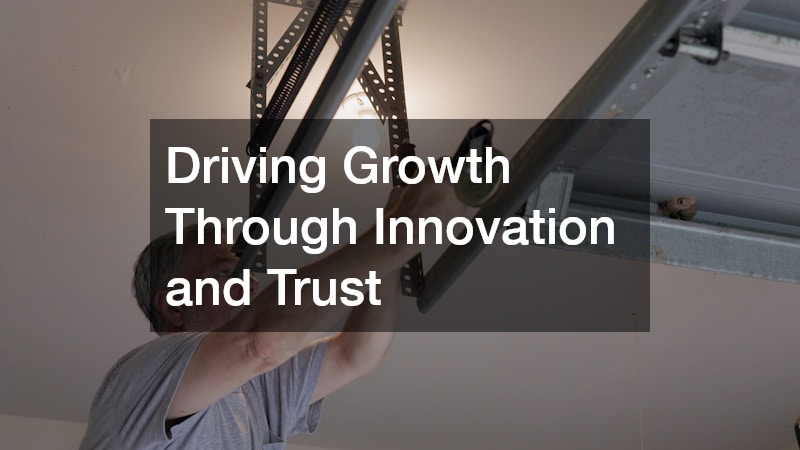Running a successful business requires more than just offering a product or service—it demands a careful balance of financial management, strategic branding, and efficient operations. Many business owners start out with passion and technical expertise, but quickly realize that growth and sustainability involve navigating complex challenges beyond their craft. Financial stability ensures you can weather unexpected downturns and invest in opportunities. Strong branding builds recognition and trust, helping you stand out in crowded markets. Operational excellence ensures consistency, efficiency, and customer satisfaction, which ultimately drive repeat business and referrals.
What makes this balance so important is that each area reinforces the other. Without sound financial practices, even the best branding or operational systems can collapse under the weight of poor cash flow. Similarly, neglecting branding makes it harder to attract new customers, no matter how efficient your operations may be. And without solid operational systems, businesses risk damaging their reputation with inconsistent service or unmet promises.
In today’s fast-moving marketplace, leaders can’t afford to focus on just one piece of the puzzle. They must actively connect the dots—aligning financial expertise with clear brand strategies and streamlined operations. This integrated approach not only reduces risk but also positions businesses for sustainable growth in competitive environments. Throughout this article, we’ll explore how different industries have applied these principles in practical ways, and what lessons any business owner can take from their successes.
By looking at a variety of examples, we’ll see how financial discipline provides a strong foundation, how branding strategies help businesses carve out their identity, and how operations tie everything together in the daily reality of serving customers. Whether you’re in a niche trade or a broad service sector, the same core principles apply—and mastering them can be the difference between short-lived momentum and long-term success.

Strengthening Finances with Expert Guidance
Finances are the lifeblood of every business, and how you manage them can either accelerate growth or hinder progress. While many entrepreneurs try to juggle their accounts on their own, there comes a point where professional expertise becomes invaluable. This is where a business tax accountant proves indispensable.
A tax accountant doesn’t just file paperwork; they help you navigate complex regulations, maximize deductions, and plan for the future. Success in this area stems from shifting your mindset—from seeing accounting as a once-a-year obligation to recognizing it as a continuous strategic tool. For instance, scheduling quarterly check-ins with your accountant allows you to identify trends early, adjust budgets, and avoid costly surprises at tax time.
For service-based businesses, like a semi truck washing company or a tree removal business, profit margins can be tight. Every dollar counts, and failing to account for small expenses like waste disposal, insurance, or seasonal labor fluctuations can quickly erode profitability. A skilled accountant ensures these variables are built into your financial forecasts, giving you clarity and control.
Another critical step is tracking key financial metrics: net profit margin, customer acquisition cost, and cash reserves. A roofing business, for example, may appear profitable during peak season but struggle with cash flow in the winter. With expert guidance, the business can plan ahead, smoothing income and ensuring success throughout the year.
Ultimately, strengthening your finances requires discipline, transparency, and professional support. Success follows when you align financial decision-making with your long-term vision instead of chasing short-term fixes.
Improving Service Quality with Operational Precision
Operational efficiency directly impacts customer satisfaction and profitability. For businesses in service-heavy industries, delivering consistent quality requires structured systems and attention to detail.
Take semi truck washing as an example. Fleet managers expect not only clean vehicles but also quick turnaround times to minimize downtime. Precision in scheduling, water recycling, and environmental compliance makes the difference between mediocre and exceptional service. Success here is defined by reliability—meeting deadlines without sacrificing quality.
Establishing Standard Operating Procedures (SOPs) is crucial. A tree removal business, for instance, can standardize safety checks before every job, reducing liability risks and ensuring efficiency. Likewise, an office cleaning company that implements detailed checklists for staff ensures consistent results across all client sites.
Technology can further enhance precision. Scheduling software, digital invoicing, and mobile apps for team communication streamline workflows. A towing company using GPS-enabled dispatch systems reduces wait times for stranded drivers, boosting both efficiency and customer satisfaction.
Ultimately, operational precision is about creating systems that free you from micromanagement. When your team understands expectations and your processes minimize error, you build a reputation for reliability. That reputation is what transforms satisfied clients into repeat customers, fueling long-term success.
Building Reputation in Competitive Markets
Reputation is often a business’s most valuable asset, particularly in industries where competition is fierce. For a roofing business, reputation determines whether a homeowner chooses your services or looks elsewhere.
Success in reputation management starts with quality craftsmanship. Roofing jobs are high-stakes investments, and clients expect durable materials, precise installation, and transparency in pricing. Cutting corners may save money in the short term but can devastate your reputation long term.
Customer service is equally critical. A client who feels heard and respected is more likely to recommend your services to others. Encourage reviews and testimonials, and don’t shy away from addressing negative feedback professionally. Word-of-mouth marketing remains powerful in industries like roofing, landscaping, and garage doors, where trust is paramount.
Community involvement also strengthens reputation. Sponsoring local events, participating in charity work, or offering free consultations can help establish your business as a trustworthy and visible presence. Over time, these actions compound into a reputation that not only attracts clients but also sustains success across seasons.

Driving Growth Through Innovation and Trust
Innovation fuels growth, but trust keeps it sustainable. Consider the garage door business, which has evolved dramatically with the rise of smart home technology. Customers no longer want just a door—they expect features like smartphone integration, enhanced security, and energy efficiency.
Staying competitive means adopting these innovations early and educating clients about their benefits. However, success is not just about new products; it’s about building trust while delivering them. Customers want reassurance that these innovations are reliable, safe, and backed by responsive support.
Investing in ongoing training for staff ensures installations are flawless and clients feel confident. Offering warranties or service agreements further demonstrates commitment to long-term customer satisfaction.
The blend of innovation and trust creates a powerful growth engine. Businesses that master both are not only able to capture market share but also retain it, ensuring enduring success.
Enhancing Client Satisfaction with Tailored Solutions
In industries where services are highly personalized, tailoring solutions to client needs is a winning strategy. A landscaping business, and trees removal service for example, thrives when it goes beyond mowing lawns to design customized outdoor living spaces that reflect each client’s vision.
Success in this realm comes from active listening. Conduct thorough consultations, ask questions about lifestyle and preferences, and present tailored proposals. Offering tiered service packages also allows clients to choose based on budget and priorities, increasing satisfaction and retention.
Eco-friendly practices, like using native plants or installing smart irrigation systems, appeal to environmentally conscious clients. Similarly, a mobile auto detailer that uses water-saving techniques or non-toxic products attracts sustainability-minded customers.
Client satisfaction isn’t a one-time goal; it’s an ongoing process of exceeding expectations. Businesses that consistently deliver tailored solutions develop stronger relationships, turning customers into long-term advocates who fuel continued success.
Managing Risk and Safety with Best Practices
Every industry faces risks, but some—like a tree removal business—carry higher stakes due to the inherent dangers of the work. Success here depends on prioritizing safety and implementing best practices.
Investing in proper training and certifications for employees minimizes accidents and protects both staff and clients. Equipping crews with modern safety gear and maintaining equipment regularly further reduces risks.
Beyond physical safety, risk management also includes financial protection. Carrying adequate insurance, adhering to local regulations, and maintaining transparent contracts safeguard the business from liability.
The payoff is twofold: reduced exposure to costly setbacks and enhanced credibility with clients who value professionalism. Whether it’s a roofing business, towing company, or office cleaning service, managing risk through best practices creates a stable foundation for long-term success.

Expanding Reach Through Mobility and Flexibility
Flexibility is a competitive advantage in today’s fast-paced marketplace. A mobile auto detailer, for instance, succeeds by bringing services directly to customers, saving them time and hassle.
Mobility also allows businesses to adapt to changing market demands. A towing company that expands coverage areas or offers flexible service packages appeals to a broader audience. Similarly, a landscaping business that adjusts to seasonal needs ensures year-round revenue.
The key to success lies in balancing convenience with reliability. Mobile services must be just as professional and consistent as stationary ones. Investing in scheduling software, GPS routing, and mobile payment systems enhances efficiency while keeping clients satisfied.
By embracing mobility and flexibility, businesses position themselves to capture new opportunities while staying relevant in a rapidly changing world.
Streamlining Operations with Smarter Systems
Efficiency is the hallmark of businesses that scale successfully. For a towing company, the ability to respond quickly to stranded drivers depends on streamlined dispatch and communication systems.
Success in operational streamlining starts with technology. GPS tracking, automated billing, and digital scheduling tools save time and reduce human error. For an office cleaning company, implementing time-tracking software ensures staff accountability while reducing overhead.
Equally important is process optimization. Regularly reviewing workflows to eliminate bottlenecks and redundancies boosts productivity. Delegating non-core tasks, such as payroll or IT support, allows business owners to focus on strategic growth.
Smarter systems don’t just save money; they create consistency. When clients know they can count on reliable service, whether from a semi truck washing company or a roofing contractor, trust builds—and trust is the ultimate currency of long-term success.

Delivering Consistency Through Professional Standards
Consistency breeds trust, and trust drives repeat business. An office cleaning company exemplifies this principle—clients rely on them to provide the same level of cleanliness day after day. Maintaining high standards across every job ensures that clients feel confident leaving the work to your team, creating a sense of reliability that sets your business apart.
Establishing professional standards is the cornerstone of consistency. Create detailed checklists, train staff thoroughly, and implement regular quality audits. When clients see consistent results, they’re more likely to renew contracts and recommend your services. Incorporating feedback loops, such as post-service surveys or follow-up calls, can help identify areas for improvement and ensure standards are maintained over time.
Professionalism also extends to communication and reliability. Returning calls promptly, showing up on time, and addressing issues proactively demonstrate respect for clients’ time and needs. Documenting standard protocols for handling customer complaints or special requests ensures all team members respond uniformly, reducing errors and enhancing client confidence.
The ripple effect of professionalism is powerful. A garage door business that consistently delivers high-quality installations or a landscaping business that maintains punctuality builds reputations that translate directly into long-term success. Consistency also reinforces employee accountability and pride in work, which in turn enhances morale and retention. Over time, these practices contribute not only to client satisfaction but also to operational efficiency and a stronger brand reputation.
In addition, integrating technology—like scheduling software, quality tracking apps, or automated reminders—can help maintain these standards at scale. Even as your business grows, clients continue to experience the same reliable service, ensuring trust remains unbroken. Ultimately, the businesses that prioritize consistency and professionalism create a virtuous cycle where satisfied clients lead to referrals, repeat engagements, and sustained growth.
Balancing finances, branding, and operations is not a one-time effort—it’s an ongoing commitment that defines the long-term success of any business. From carefully managing cash flow with the help of expert advisors to strategically using branding tools that set your company apart, every decision has a ripple effect on sustainability. Operational efficiency, whether in a highly specialized trade like semi truck washing or a broad service industry such as landscaping, can mean the difference between surviving and thriving in competitive markets.
The examples discussed—from roofing and garage door services to mobile auto detailers, towing providers, and office cleaning specialists—demonstrate that every industry faces unique challenges, but all share the same need for strategic planning and consistent execution. A business tax accountant may help with financial clarity, while strong branding tools like business signs support market presence. Safety, innovation, risk management, and customer trust remain universal pillars across industries, regardless of size or specialization.
Ultimately, success belongs to businesses that take a holistic view. Leaders who understand how financial stewardship, branding, and operations complement one another are better positioned to adapt, grow, and build lasting reputations in their communities. When these three elements are balanced effectively, businesses not only achieve stability but also create opportunities for expansion and long-term profitability.
The key is to remain proactive—seeking expert guidance, investing in branding that resonates, and continually refining processes that streamline operations. By doing so, any business can move beyond short-term wins and establish a foundation built for enduring success.


